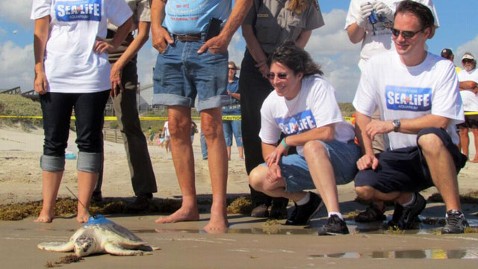Kemp's Ridley Sea Turtle, Stranded in Holland, Released on Texas Coast

Image: National Park Service.
They named her Flip - a Kemp's Ridley sea turtle found last December, stranded on the coast of Holland. She was injured and stunned by the cold.
But the scientists and animal lovers who rescued her took advantage of a key fact about Kemps' Ridleys - that while they're endangered, they are also among the world's great long-distance travelers. Specialists nursed her back to health, and released her into the water today - off the coast of south Texas.
"We couldn't have asked for it to go any better," said Iain Scouller, the general manager of Sea Life Aquarium Grapevine, based near Dallas-Fort Worth. "We set her loose at high tide, and off she went."
A lot of effort went into the rescue of a single four-year-old turtle, but Scouller said it matters for a species very much in danger of disappearing.
"It's as much symbolic as anything," he said.
His colleague, Karen Rifenbury, joined in. "One turtle makes a great difference because of the number of eggs she'll lay in her lifetime. We hope she will help revive the species."
Flip was found on the rocky Dutch coast last December, about 5,000 miles from her likely birthplace in the Gulf of Mexico, and slowly nursed back to health by staff members at a Dutch aquarium. She was then flown from Amsterdam to Houston - the aquarium staff is quick to thank KLM, the Dutch airline - in a special container that kept the water around her at 22 degrees Centigrade (about 75 degrees Fahrenheit). She was driven to Port Aransas, Texas, for today's release.
"It is likely that most individuals remain in the Gulf of Mexico for their entire lives," wrote Donna Shaver of the National Park Service, in an email to ABC News. "However, some juveniles are shunted out of the Gulf of Mexico through the Gulf Stream and travel up the Atlantic coast of the U.S. to forage in nearshore waters and bays as far north as Massachusetts."
Shaver has devoted much of her career to the preservation of sea turtles, and said it was rare, and risky, for a turtle like Flip to have gotten as far as northern Europe. "There are only a few records of Kemp's Ridleys being found stranded alive in this region. The waters there are too cold for their survival."
Flip, at last report, is safely out in the warm waters of the Gulf, wearing an identification tag and a satellite transmitter glued to the back of her shell. Turtles' shells grow, and have a waxy protective layer over them, so the transmitter will probably come off at some point, but in the meantime it will provide useful data on Flip's travels. People will be able to track Flip at SeaTurtle.org.
"This is much bigger than a single turtle," said Scouller. "It shows that every one counts."